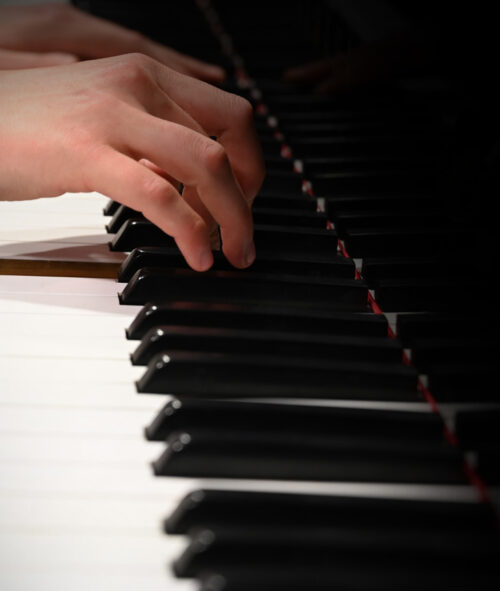Piano Lesson and Services FAQs
Is 2 years enough to learn piano?Dan Forbes2024-10-18T17:19:50+00:00
- Basic to Intermediate Skills: In 2 years, a dedicated student can achieve a solid intermediate level, able to play a variety of pieces and understand fundamental music theory.
- Continuous Learning: Piano learning is a continuous process, and even after 2 years, there is always more to learn and improve upon.
What if we are just too busy for lessons now?Dan Forbes2024-10-18T17:26:19+00:00
Did you know that we offer in-home travel lessons for a small additional fee? (Subject to DFM availability in a given locality on a particular day of the week.)
What if it’s just too expensive?Dan Forbes2024-10-18T17:13:09+00:00
- Did you know that you can save 7-17% off tuition cost simply by purchasing a lessons package?
- Also, DFM is involved with LAMP and Gull Lake Partnerships, enabling participating homeschooling families to get free or drastically reduced cost lessons.
What should you not do when moving a piano?Radu2024-05-30T10:20:26+00:00
- Avoid DIY Moving: Do not attempt to move a piano without professional help to avoid damage.
- Inadequate Equipment: Do not use inadequate moving equipment, such as standard dollies, which can damage the piano.
- Improper Handling: Avoid tipping the piano on its side or placing undue stress on its legs and pedals.
How long can a piano not be tuned?Radu2024-05-30T10:20:10+00:00
- Recommended Frequency: It’s recommended to tune a piano at least once a year. Going beyond this can lead to tuning instability and potential damage.
- Extended Periods: If a piano is not tuned for several years, it may require multiple tuning sessions to stabilize the pitch.
Can you move a piano without it going out of tune?Radu2024-05-30T10:19:53+00:00
- Depends on the Move: Minor moves within the same room may not significantly affect tuning, but long-distance moves or moves involving significant jostling typically require the piano to be retuned.
- Professional Movers: Using professional piano movers can help minimize the impact on tuning.
Are pianos perfectly in tune?Radu2024-05-30T10:19:32+00:00
- Equal Temperament Tuning: Pianos are typically tuned to a system called equal temperament, which is a compromise that allows the piano to play in all keys reasonably well, but not perfectly in tune in any single key.
- Inherent Imperfections: Due to the nature of the instrument and tuning system, no piano is perfectly in tune across all notes.
Does banging on a piano make it go out of tune?Radu2024-05-30T10:19:22+00:00
- Yes: Playing a piano aggressively can cause the strings to stretch and the tuning to become unstable, leading to it going out of tune.
Can a piano be impossible to tune?Radu2024-05-30T10:19:09+00:00
- Environmental Changes: Fluctuations in humidity and temperature are primary causes of a piano going out of tune.
- Frequent Use: Regular and vigorous playing can affect the tuning stability.
- Age: As a piano ages, its ability to hold a tune can diminish.
Can a 100 year old piano be tuned?Radu2024-05-30T10:18:51+00:00
- Possible but Challenging: It is possible to tune a 100-year-old piano, but it may require extensive repairs and adjustments.
- Consult a Technician: An experienced piano technician can assess the piano’s condition and determine the feasibility of tuning it
What happens if a piano is not tuned for years?Radu2024-05-30T10:18:35+00:00
- String and Pin Deterioration: The strings and tuning pins may deteriorate, making future tuning difficult or impossible.
- Sound Quality: The overall sound quality of the piano will degrade, making it less enjoyable to play.
What happens if you don’t tune a piano for a long time?Radu2024-05-30T10:18:19+00:00
- Drifting Pitch: The pitch of the piano will drift, making it sound out of tune with itself and other instruments.
- Increased Tension: Neglecting regular tuning can cause uneven tension across the strings, leading to potential damage.
What happens if a piano hasn’t been tuned in 20 years?Radu2024-05-30T10:18:08+00:00
- Severe Out of Tune: The piano will likely be significantly out of tune, and multiple tuning sessions may be required to restore it.
- Structural Issues: Long periods without tuning can lead to structural issues, such as cracked soundboards or loose tuning pins.
How long does it typically take to tune a piano?Radu2024-05-30T10:17:56+00:00
- Standard Tuning: A standard tuning session typically takes about 1 to 2 hours.
- Additional Repairs: If additional repairs or adjustments are needed, the session may take longer.
What affects piano tuning?Radu2024-05-30T10:17:43+00:00
- Humidity and Temperature: Changes in humidity and temperature can cause the wooden components of the piano to expand and contract, affecting tuning.
- Usage: Frequent playing, especially with heavy-handedness, can knock the strings out of tune.
- Age and Condition: Older pianos or those in poor condition may not hold their tuning as well as newer or well-maintained instruments.
How much should I expect to pay for piano tuning?Radu2024-05-30T10:17:27+00:00
- Average Cost: The typical cost for piano tuning ranges from $100 to $200, depending on the location and the experience of the technician.
- Additional Services: If the piano requires repairs or additional maintenance, the cost may be higher.
What if my kids will just drop out of piano lessons anyway, it will be a waste of money?Radu2024-10-18T17:00:16+00:00
The average enrollment time of our current DFM student list is 18 months, and several families are pre-paid, some as far ahead as 1 year!
- I urge all students to push past the initial resistance point. Doing so increases student results at least tenfold. Whenever we start something new in life, there is an excitement and novelty. When we realize there may be work involved than we initially thought, it can look daunting, and we might question our progress or innate availabilities. Here are some practical ways to overcome burnout:
- For the student, being exposed to other talented student and artists, as well as being shown their own progress of what they can play now versus what they could play when they started.
- For the parent, remembering why you are here. Aside from the brain benefits, your child is getting the 3 C’s: confidence, creativity and communication. Building confidence by learning music will help them feel more confident to approach and tackle other challenges. Developing their creativity through our workshop programs exercises the problem solving and creativity areas of the brain. Our world now faces unprecedented problems and will require a creative generation to find new answers to the challenges we face. Finally learning to speak music with other musicians leads to developing the teamwork and group communication that is so needed in today’s workplace.
- For the teacher, changing instructors or approaches. DFM has 3 piano instructors that offer different techniques and teaching approaches for different learning styles.
How late is too late to learn piano?Radu2025-09-30T16:58:55+00:00
- Never Too Late: There is no age limit for learning the piano. Adults can start learning at any age and still achieve a high level of proficiency with dedication and practice. https://youtu.be/3AZtnLmCsFU
Is practicing piano 1 hour a day enough?Radu2024-10-18T16:00:04+00:00
- Consistent Practice: Practicing 1 hour a day is generally sufficient for steady progress, especially for beginners.
- Quality Over Quantity: Focus on the quality of practice, ensuring you’re practicing correctly and effectively.
How often should a beginner take piano lessons?Radu2024-05-30T10:15:08+00:00
- Weekly Lessons: Most beginners benefit from taking one lesson per week.
- Practice Time: Daily practice, even if it’s just 15-30 minutes, helps reinforce lessons and improve skills.
How long does it realistically take to learn piano?Radu2024-05-30T10:14:57+00:00
- Basic Proficiency: It typically takes 6 months to a year of regular practice to become comfortable with basic piano playing.
- Intermediate Level: Reaching an intermediate level often takes 2 to 3 years of consistent practice.
- Advanced Skills: Achieving advanced proficiency can take several years and requires dedicated practice.
What is the best age to learn piano?Radu2024-05-30T10:14:43+00:00
- Starting Young: Many children start piano lessons around ages 5 to 7, when they can follow instructions and have the dexterity to play.
- Adult Learners: It’s never too late to start learning the piano. Adults can also successfully learn and enjoy playing the piano.
How long is a typical piano lesson?Radu2024-05-30T10:14:29+00:00
- Standard Duration: Most piano lessons are 30 to 60 minutes long.
- Beginner Lessons: For younger students or beginners, 30-minute lessons are common.
- Advanced Students: More advanced students often benefit from longer, 45 to 60-minute lessons.
How much should I charge for beginner piano lessons?Radu2024-05-30T10:14:05+00:00
- Average Rates: Beginner piano lesson rates typically range from $30 to $50 per hour.
- Experience and Location: Rates can vary based on the instructor’s experience, location, and whether the lessons are in-person or online.
What to expect from my first piano lesson?Radu2024-05-30T10:13:55+00:00
- Introduction: Meeting your instructor and discussing your musical background and goals.
- Assessment: The instructor will assess your current skill level.
- Basics: Learning the layout of the keyboard, basic posture, and possibly a simple song or exercise.
- Homework: Assignments or practice routines to prepare for the next lesson.
How should piano lessons be structured?Radu2024-05-30T10:13:35+00:00
- Warm-up Exercises: Begin with finger exercises or scales to warm up.
- Review: Go over previous lessons and practice pieces.
- New Material: Introduction of new pieces, techniques, or theory concepts.
- Practice Strategies: Tips and methods for effective practice.
- Cool Down: Ending with easier pieces or free play to conclude the lesson.
What to expect with piano lessons?Radu2024-05-30T10:13:21+00:00
- Personalized Instruction: Lessons tailored to your skill level and musical goals.
- Regular Practice: Expect to practice regularly to reinforce what you learn in lessons.
- Progression: Gradual increase in difficulty as your skills improve, with regular feedback from your instructor.
- Music Theory: Lessons on the theoretical aspects of music, which will enhance your playing and understanding.
What are the basic things to know about piano?Radu2024-05-30T10:13:04+00:00
- Understanding the Keyboard: The piano keyboard consists of white and black keys arranged in a repeating pattern. Each set of keys represents a musical octave.
- Reading Music: Basic knowledge of reading sheet music is essential, including understanding notes, rhythms, and musical symbols.
- Posture and Hand Position: Proper posture and hand position are crucial for playing the piano effectively and avoiding injury.
- Scales and Chords: Learning scales and chords is fundamental for developing finger strength and understanding music theory.
How late is too late to learn piano?Radu2024-05-30T10:12:07+00:00
- Never Too Late: There is no age limit for learning the piano. Many adults and even seniors successfully take up piano playing.
- Benefits for Adults: Learning piano as an adult can be a rewarding experience, providing cognitive benefits, stress relief, and a sense of achievement.
- Flexible Goals: Adult learners often have different goals than younger students, such as playing for personal enjoyment rather than preparing for exams or performances.
How often should a beginner take piano lessons?Radu2024-05-30T10:12:07+00:00
- Weekly Lessons: It’s recommended for beginners to have one lesson per week. This frequency allows for consistent progress without overwhelming the student.
- Practice Time: Daily practice, even if it’s just 15-30 minutes, is essential to reinforce what is learned in weekly lessons and to build muscle memory and technique.
How long is a typical piano lesson?Radu2024-05-30T10:12:07+00:00
- Standard Duration: Most piano lessons last between 30 to 60 minutes.
- Beginners: 30-minute lessons are common for beginners, especially younger students, to maintain focus and build foundational skills.
- Intermediate to Advanced: More advanced students often benefit from longer lessons, ranging from 45 to 60 minutes, to cover more complex material and techniques.
What to expect with piano lessons?Radu2024-10-17T15:25:31+00:00
- Personalized Instruction: Lessons tailored to your skill level and musical goals.
- Regular Practice: Expect to practice regularly to reinforce what you learn in lessons.
- Progression: Gradual increase in difficulty as your skills improve, with regular feedback from your instructor.
- Music Theory: Lessons on the theoretical aspects of music, which will enhance your playing and understanding.



